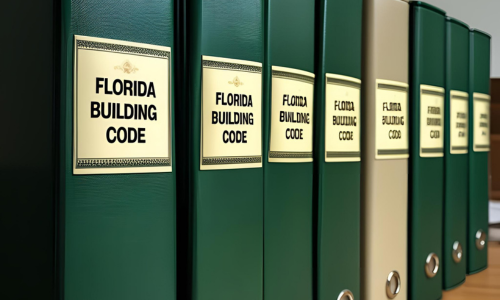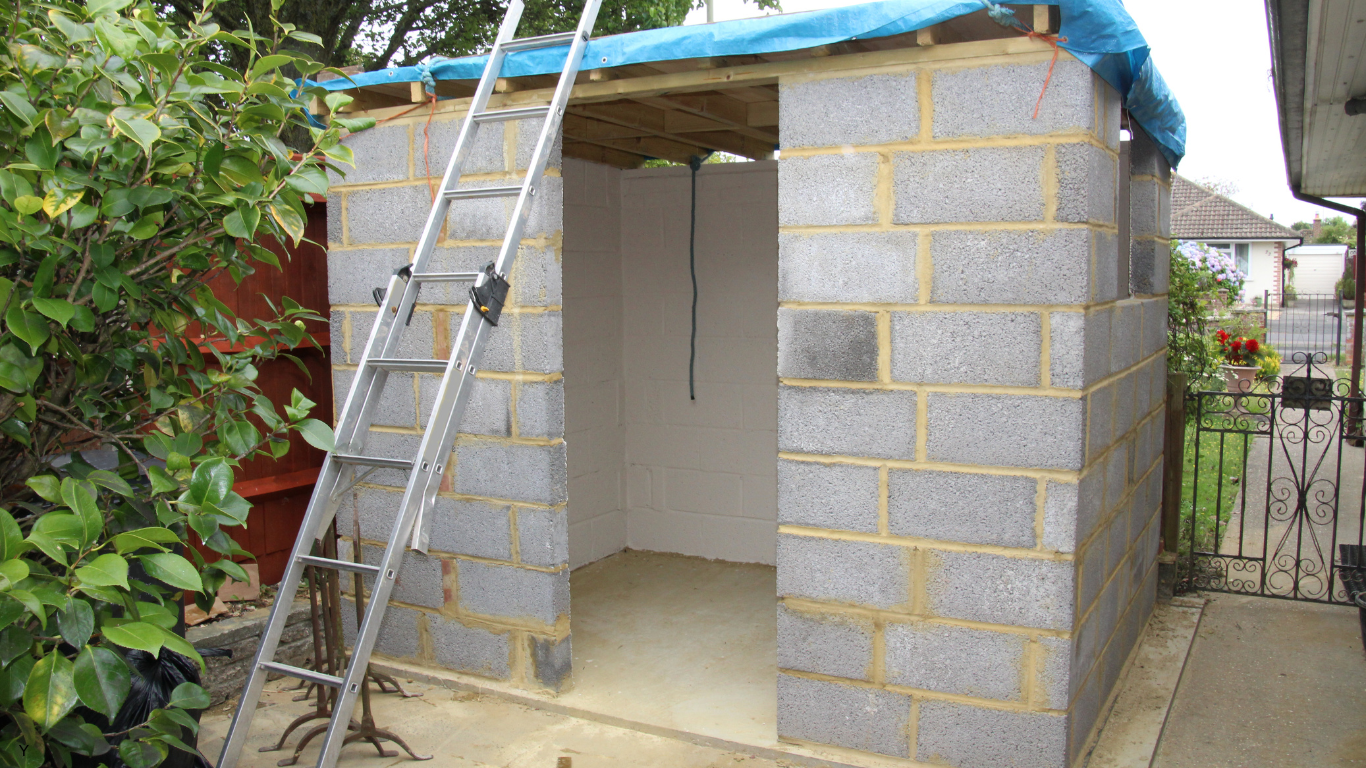Newly Enacted HB 267 (2024) Makes Numerous Changes to Florida’s Building Code Act
House Bill 267, which was signed by Governor DeSantis on May 17, 2024, takes effect on January 1, 2025 and makes numerous changes to Chapter 553, Florida Statutes, which governs building construction standards in Florida. Essentially all of the changes are to Part IV of Chapter 553, Florida Statutes, which regulates Florida’s Building Code. Actual text of the changes is below, but in summary the changes affect plan requirements for window, door, and garage door replacements; make changes to the sections governing private providers; impose new deadlines for permit application approvals and penalties for failing to meet them; and new standards for certain unvented spaces.
Text of Changes
553.73, Florida Statutes, is modified to add a new paragraph 7(g), which removes requirements for sealed drawings for replacement of windows, doors, or garage doors under certain conditions, as follows:
(g) The commission shall modify the Florida Building Code to state that sealed drawings by a design professional are not required for the replacement of windows, doors, or garage doors in an existing one-family or two-family dwelling or townhouse if all of the following conditions are met:
1. The replacement windows, doors, or garage doors are installed in accordance with the manufacturer's instructions for the appropriate wind zone.
2. The replacement windows, doors, or garage doors meet the design pressure requirements in the most recent version of the Florida Building Code, Residential.
3. A copy of the manufacturer's instructions is submitted with the permit application in a printed or digital format.
4. The replacement windows, doors, or garage doors are the same size and are installed in the same opening as the existing windows, doors, or garage doors.
553.79, Florida Statutes, is amended to delete paragraph 16 which sets forth various deadlines relating to building permit approvals and corrections. Most of these items are then re-addressed in another section of the statute described below.
The bill also makes several changes to 553.791, Florida Statutes, which governs alternative plans review and inspections. While the statute has contained a definition for private providers, the following definition of a private provider firm is added under the new statute:
(o) "Private provider firm" means a business organization, including a corporation, partnership, business trust, or other legal entity, which offers services under this chapter to the public through licensees who are acting as agents, employees, officers, or partners of the firm. A person who is licensed as a building code administrator under part XII of chapter 468, an engineer under chapter 471, or an architect under chapter 481 may act as a private provider for an agent, employee, or officer of the private provider firm.
Other changes to the statute include a change to 15 days to dispute plan deficiencies noticed by local building official instead of 14, and that a private provider must provide notice to local building official of approximate date and time of any such inspection conducted by the private provider.
Paragraph 10 is added to 553.791, Florida Statutes, to address what building officials must do with plans where the private provider is a licensed architect or engineer, as follows:
(10) If the private provider is a person licensed as an engineer under chapter 471 or an architect under chapter 481 and affixes his or her professional seal to the affidavit required under subsection (6), the local building official must issue the requested permit or provide a written notice to the permit applicant identifying the specific plan features that do not comply with the applicable codes, as well as the specific code chapters and sections, within 10 business days after receipt of the permit application and affidavit. In such written notice, the local building official must provide with specificity the plan's deficiencies, the reasons the permit application failed, and the applicable codes being violated. If the local building official does not provide specific written notice to the permit applicant within the prescribed 10-day period, the permit application is deemed approved as a matter of law, and the local building official must issue the permit on the next business day.
Finally, paragraph 20 is amended as follows to limit the number and way a building code enforcement agency can audit private providers:
(20) A Each local building code enforcement agency may not audit the performance of building code inspection services by private providers operating within the local jurisdiction until the agency has created standard operating private provider audit procedures for the agency's internal inspection and review staff, which includes, at a minimum, the private provider audit purpose and scope, private provider audit criteria, an explanation of private provider audit processes and objections, and detailed findings of areas of noncompliance. Such private provider audit procedures must be publicly available online and a printed version must be readily accessible in agency buildings. The private provider audit results of staff for the prior two quarters also must be publicly available. The agency's audit processes must adhere to the agency's posted standard operating audit procedures. However, The same private provider or private provider firm may not be audited more than four times in a year month unless the local building official determines a condition of a building constitutes an immediate threat to public safety and welfare, which must be communicated in writing to the private provider or private provider firm. Work on a building or structure may proceed after inspection and approval by a private provider. if the provider has given notice of the inspection pursuant to subsection (9) and, subsequent to such inspection and approval, The work may shall not be delayed for completion of an inspection audit by the local building code enforcement agency.
553.792, Florida Statutes, which governs building permit applications is one of the most heavily amended sections of the statute, with many new paragraphs being added and many existing paragraphs deleted. 553.792(1)(a) is added to the set strict time limits for approval, approval with conditions, or denials of permits based on the type of permit and size of the structure, as follows:
(1)(a) A local government must approve, approve with conditions, or deny a building permit application after receipt of a completed and sufficient application within the following timeframes, unless the applicant waives such timeframes in writing:
1. Within 30 business days after receiving a complete and sufficient application, for an applicant using a local government plans reviewer to obtain the following building permits if the structure is less than 7,500 square feet: residential units, including a single-family residential unit or a single-family residential dwelling, accessory structure, alarm, electrical, irrigation, landscaping, mechanical, plumbing, or roofing.
2. Within 60 business days after receiving a complete and sufficient application, for an applicant using a local government plans reviewer to obtain the following building permits if the structure is 7,500 square feet or more: residential units, including a single-family residential unit or a single-family residential dwelling, accessory structure, alarm, electrical, irrigation, landscaping, mechanical, plumbing, or roofing.
3. Within 60 business days after receiving a complete and sufficient application, for an applicant using a local government plans reviewer to obtain the following building permits: signs or nonresidential buildings that are less than 25,000 square feet.
4. Within 60 business days after receiving a complete and sufficient application, for an applicant using a local government plans reviewer to obtain the following building permits: multifamily residential, not exceeding 50 units; site-plan approvals and subdivision plats not requiring public hearing or public notice; and lot grading and site alteration.
5. Within 12 business days after receiving a complete and sufficient application, for an applicant using a master building permit consistent with s. 553.794 to obtain a site-specific building permit.
6. Within 10 business days after receiving a complete and sufficient application, for an applicant for a single-family residential dwelling applied for by a contractor licensed in this state on behalf of a property owner who participates in a Community Development Block Grant-Disaster Recovery program administered by the Department of Commerce, unless the permit application fails to satisfy the Florida Building Code or the enforcing agency's laws or ordinances.
However, the local government may not require the waiver of the timeframes in this section as a condition precedent to reviewing an applicant's building permit application.
(b) A local government must meet the timeframes set forth in this section for reviewing building permit applications unless the timeframes set by local ordinance are more stringent than those prescribed in this section.
Paragraph (1)(c) is amended as follows to require notice within 5 days of receipt of a permit application of any additional information that will be required to determine is the application is complete:
(c) After Within 10 days of an applicant submits submitting an application to the local government, the local government must provide written notice to the applicant within 5 business days after receipt of the application advising shall advise the applicant what information, if any, is needed to deem or determine that the application is properly completed in compliance with the filing requirements published by the local government. If the local government does not provide timely written notice that the applicant has not submitted the properly completed application, the application is shall be automatically deemed or determined to be properly completed and accepted.
Paragraph 1(e) is modified as follows to require a building department to reduce its permit fee by 10% for each day that it fails to meet the statutory deadlines, unless otherwise agreed to as follows:
(e)(c) If a local government fails to meet a deadline under this subsection provided in paragraphs (a) and (b), it must reduce the building permit fee by 10 percent for each business day that it fails to meet the deadline, unless the parties agree in writing to a reasonable extension of time, the delay is caused by the applicant, or the delay is attributable to a force majeure or other extraordinary circumstances. Each 10-percent reduction shall be based on the original amount of the building permit fee, unless the parties agree to an extension of time.
Paragraphs (f) and (g) are added however to limit the circumstances under which the 10% reduction must be given by the building department, and to require the building department to reduce the permit fee by 20% for each day it fails to meet the statutory deadline when revisions have been submitted at the request of the building department:
(f) A local enforcement agency does not have to reduce the building permit fee if it provides written notice to the applicant by e-mail or United States Postal Service within the respective timeframes in paragraph (a) which specifically states the reasons the permit application fails to satisfy the Florida Building Code or the enforcing agency's laws or ordinances. The written notice must also state that the applicant has 10 business days after receiving the written notice to submit revisions to correct the permit application and that failure to correct the application within 10 business days will result in a denial of the application.
(g) If the applicant submits revisions within 10 business days after receiving the written notice, the local enforcement agency has 10 business days after receiving such revisions to approve or deny the building permit unless the applicant agrees to a longer period in writing. If the local enforcement agency fails to issue or deny the building permit within 10 business days after receiving the revisions, it must reduce the building permit fee by 20 percent for each business day that it fails to meet the deadline unless the applicant agrees to a longer period in writing.
Finally, 553.9065, Florida Statutes, is created to address efficiency standards for unvented attics and unvented enclosed rafter assemblies:
(1) Unvented attic and unvented enclosed rafter assemblies that are insulated and air sealed with a minimum of R-20 air-impermeable insulation meet the requirements of sections R402 of the Florida Building Code, 8th Edition (2023), Energy Conservation, if all of the following apply:
(a) The building has a blower door test result of less than 3 ACH50.
(b) The building has a positive input ventilation system or a balanced or hybrid whole-house mechanical ventilation system.
(c) If the insulation is installed below the roof deck and the exposed portion of roof rafters is not already covered by the R-20 air-impermeable insulation, the exposed portion of the roof rafters is insulated by a minimum of R-3 air-impermeable insulation unless directly covered by a finished ceiling. Roof rafters are not required to be covered by a minimum of R-3 air-impermeable insulation if continuous insulation is installed above the roof deck.
(d) All indoor heating, cooling, and ventilation equipment and ductwork is inside the building thermal envelope.
(2) The commission shall review and consider this section and any technical changes thereto and report such findings to the Legislature by December 31, 2024.
About the Author
Jason Lambert is a Florida Board Certified Construction Attorney and Partner in the Construction Industry Practice Group at Hill Ward Henderson, in Tampa, Florida. He is also the founder and chief contributor to the Hammer & Gavel construction law blog. Jason focuses his practice on representing contractors, subcontractors, and materials suppliers throughout the state of Florida. Before law school, Jason spent a decade working in the construction industry, primarily as a project manager and operations director for both new construction and remodeling. He can be reached at jason.lambert@hwhlaw.com or 813-227-8495.






